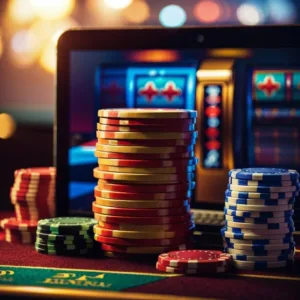
Poker skills are not just beneficial for playing the game; they can also be applied to real-life situations. Developing these skills can help you become a better decision-maker, more assertive, and improve your focus.
Financial Management
One of the most important skills you can learn from poker is managing your finances. Your bankroll is crucial in poker, and learning to handle it efficiently can prepare you for other life situations where you need to plan and distribute funds effectively.
Decision-Making Under Pressure
In poker, every decision has financial consequences. This skill is invaluable in business, where you must calculate possible rewards and take calculated risks. Poker teaches you to assess situations and make them as profitable as possible.
Patience
Another skill you can develop through poker is patience. You’ll often have to wait for long periods for a good situation to appear. Learning to be patient can help you apply it in other life situations, saving you from unnecessary frustration.
Dealing with Challenges
Dealing with any situation is another skill you can learn from poker. Losing is inevitable in the game, and learning to deal with it can help you keep your concentration and focus on things that matter instead of losing your temper. This skill can be useful in your personal and professional life when you need to face tough situations.
Reading and Understanding People
Poker also teaches you to read and understand people. You need to assess your opponents constantly, and this skill can help you recognize emotions such as fear, anxiety, and excitement in others. Understanding people’s motivations and reasoning is a valuable skill to have in your personal and professional life.
Making the Most of Your Hand
Making the most of the hand you are dealt is another skill you can learn from poker. Sometimes in life, you have to make the most out of a bad situation, and you don’t get to change your hand at will. Learning to take charge of things and make the best of bad situations can help you in many life situations.
Risk vs. Reward Principle
Finally, poker can teach you about the risk vs. reward principle. While you need to take calculated risks to make money at the tables, you also need to weigh the risks against the rewards. Learning this skill can help you make better decisions in your personal and professional life.
Assertiveness
Being assertive is crucial in business negotiations. Poker is a great environment to learn how to be more aggressive when needed. Pulling a well-timed bluff or going for extra value where your opponent is reluctant to fold can give you an edge. These skills translate well into real life situations.
Focus and Concentration
Staying focused is difficult in a world full of distractions. Poker can help train your focus. Most players tend to zone out when not involved in a hand, but staying focused on what’s going on at all times can give you valuable information. Learning how to keep your focus at the tables will translate well into other life situations.
Poker involves strategic, mathematical, and psychological elements that require skill. It challenges you on many levels and requires constant growth and development to succeed. Even playing casually but thinking about your decisions and working on improving can develop many poker skills. So, on top of having fun, you can also reap benefits that will help you succeed in your day-to-day life.
In conclusion, playing poker can help you develop various skills that can positively impact your life beyond the tables. From managing your finances to making decisions under pressure, these skills can be useful in your personal and professional life.




